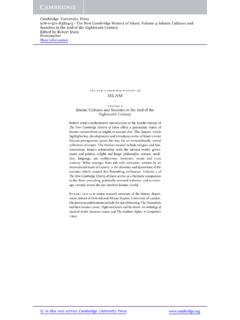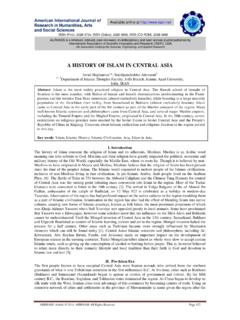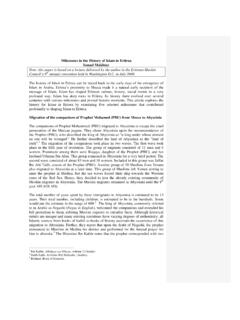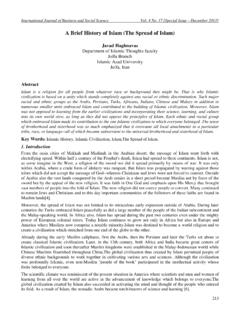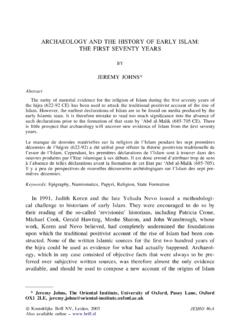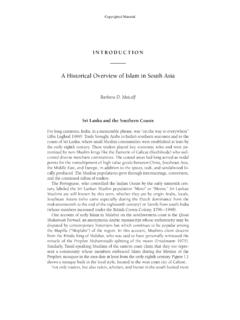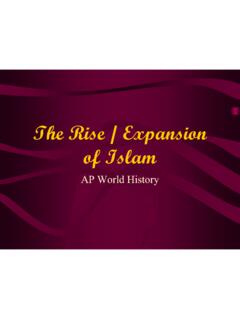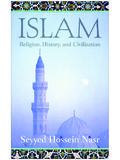Transcription of A Restatement of the History of Islam and Muslims
1 Chapter 1. Introduction This is a new story of Islam . It is the story of the movement which was launched by Muhammad, the Messenger of God, in 610 in Makkah, and was consummated with the support of his cousin, collaborator and vicegerent, Ali ibn Abi Talib, in 632 in Medina. It covers a period of ninety years from 570 when he was born in Makkah, to 661. when his successor, Ali ibn Abi Talib, was assassinated in Kufa. Countless histories of Islam have been written in the past and will be written in the future. The spectacular advance of Islam in the missionary field in our own times; the renaissance of the Muslim nations after many centuries of slumber; the obtrusion of oil as a new factor in world politics in this century; but above all and most recently, the success of the Islamic Revolution in Iran, all are acting, both in the east and in the west, as cata- lysts of a new interest in Islam .
2 The Revolution in Iran, has, in fact, triggered a world-wide explosion of interest in Islam , and many new books are being written on the subject both by Muslims and non- Muslims . In these days when the leaders of the Christian world are quietly working to realize the old dream of Christian ecumenism, many Muslims are also looking back nostalgically toward that ideal state when Islam was monolithic. Islam , however, was monolithic only during the lifetime of its Prophet, Muhammad, the blessed one. As soon as he died, the first crack appeared in the "monolith" of Islam . His followers the Muslims were polarized into two groups. In this polarization, most of his companions were on the one side and the members of his family on the other.
3 While the members of his family were occupied with his ob- sequies, some of his companions were occupied in "electing" a new lead- er to succeed him. During the interval between his death and his burial, 2. the latter gathered in the outhouse of Saqifa in Medina, and elected one out of themselves as the new head of the Muslim umma (community). They, then, confronted the members of the bereaved family with a fait accompli. This confrontation, most unfortunately, became a permanent feature of the History of the Muslims . Muhammad, the Messenger of God, may God bless him and his Ahlul- Bayt (family), belonged to the clan of Banu Hashim. After his death in 632, his cousin, son-in-law and heir-apparent, Ali ibn Abi Talib, succeeded him as the new chief of Banu Hashim.
4 Many of the compan- ions of Muhammad, the Prophet of Islam , had nursed a secret antagon- ism toward him. They could not show him their antagonism during the lifetime of the Prophet but once they were in control of his government in Medina, they were resolved, not to let it fall, through any miscalcula- tion, into the hands of Ali ibn Abi Talib. The members of the family of Muhammad, the Apostle of God, were thus precluded, by human force majeure, not only from direct succession but also from all positions of authority and power in the successive governments of his followers. The friends, followers and supporters of the family of Muhammad Mustafa, the Messenger of God, have been historically called Shia; and the friends, followers and supporters of the companions, , the party which succeeded in seizing power in Medina, have been called Sunni.
5 I. shall also identify these two groups by these names. M. Shibli, the famous Indian historian of Islam , says that almost all his- tories of Islam have been written by Sunni historians. This statement im- plies that Shia scholars did not write any histories of Islam . Why not? They did not write History for an obvious reason. All khalifas, sultans and kings were Sunni. A Shia could not publish an interpretation of Islamic History that was divergent from the official interpretation, and he had no desire to perpetuate what he believed to be the distortions of truth. He, therefore, preferred not to write any History at all. In this manner, it was the "official" account of the History of the early days of Islam that gained currency and found acceptance.
6 It was the most logical thing for the governments of the early centuries of Islam to do to put into circulation only that story which was consistent with the party line. It was also most logical for the supporters of the policies of the governments in question, to toe the party line. And in toeing the 3. party line, if they felt that it was necessary to smother truth, or at any rate, to smother the other side of the story, it was just as logical to do so. There is nothing strange, surprising or shocking in this attitude of the Sunni historians. The most logical thing for them to do, was, and is, to uphold the legitimacy of the events which transpired in Saqifa, where some of the companions, in a pre emptive strike, seized the government of Muhammad, the Sovereign of Arabia.
7 What however is strange, surprising and shocking, is that the Western historians of Islam , , the Orientalists, have swallowed up, as gospel truth, whatever the Muslim "court" historians have dished out to them as "facts." The Orientalists are supposedly objective, non-partisan, and in no way emotionally involved. The outcome of a certain contest in the dis- tant past of Islam , one way or the other, could not make any difference to them. And yet, the works of many of them reflect, not the facts but the interpretations and propagandas of the party in power. In this sense, their works are the imitations of the books "inspired" by what the Com- munists call the "ruling circles" of the Muslims .
8 The works of the Orientalists can have scientific value only if they heed the advice of the great historian of Muslim Spain, Dr. J. A. Conde. He says: "A sort of fatality attaching itself to human affairs would seem to com- mand that in the relation of historical events those of the highest import- ance should descend to posterity through the justly suspected channels of narrations written by the conquering parties. The mutation of empires, the most momentous revolutions and the overthrow of the most renowned dynasties seem all to be liable to this disadvantage. It was by the Romans that the History of their own aggrandizement was written;. the narration of their rivalry and sanguinary wars with the Carthagini- ans has come down to us from themselves; or if Greek writers have also treated the subject, these men were the tributaries and dependents of Rome, nor did they spare the flatteries best calculated to conciliate her fa- vor.
9 Scipio thus appears to us the most admirable of heroes, but is not that in part because the History of his life is the work of his admirers and flatterers? It is true that the noble and illustrious Hannibal cannot look otherwise than great and glorious even in the narratives of his mortal en- emies, but if the implacable hatred and aggressive policy of Rome had 4. not commanded the destruction of all the Punic annals, the renowned general would doubtless appear to us under an aspect differing much from that presented by the ruthless barbarian, described by Livy and ac- cepted by his readers as the portrait of Hannibal. Therefore a sound and just discrimination forbids us to content ourselves with the testimony of one side only.
10 This requires that we compare the relations of both parties with careful impartiality, and commands us to cite them with no other purpose than that of discovering the truth." ( History of the Dominion of the Arabs in Spain translated from Spanish by Mrs. J. Foster, Volume I, page 1). It cannot be gainsaid that many Orientalists have made most invalu- able contributions to the study, knowledge and understanding of Islam . It is only through their labors that many priceless treasures of Islamic History , art and literature have been rescued from oblivion, and have been preserved. It is entirely possible that many such treasures would have been lost forever if it were not for their efforts to salvage them.


